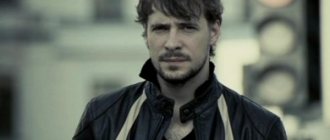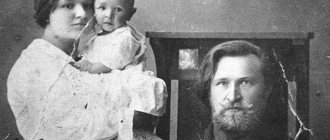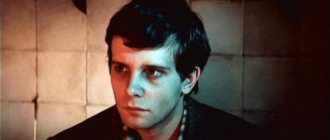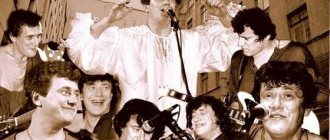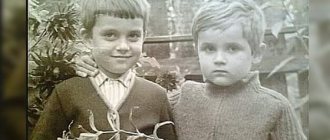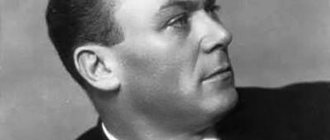Wikipedia has articles about other people with the surname Fedorov.
Wikipedia has articles about other people with the same first and last name: Fedorov, Evgeniy.
| Evgeny Fedorov | |
| Birth name: | Evgeny Evgenievich Fedorov |
| Date of Birth: | March 3, 1924(1924-03-03) (age 96) |
| Place of Birth: | USSR |
| Profession: | actor |
| Citizenship: | USSR USSR→Russia Russia |
| Years active: | 1945—present |
| Theater: | Vakhtangov Theater |
| Awards: | |
| Website: | [www.vakhtangov.ru/persones/fedorov theater named after. Vakhtangov] |
Evgeny Evgenievich Fedorov
(born March 3, 1924) - Soviet and Russian theater actor, Honored Artist of the RSFSR.
Creation
Works in the theater
- "Cyrano de Bergerac" by Edmond Rostand - Guardsman
- "Road of Victory" - Sergeant Major
- “Man with a Gun” by Nikolai Pogodin – Student
- "Oleko Dundic" - Dragic
- “Yes, that’s love” - Boris
- "Foma Gordeev" - Cheerful boy
- Shakespeare's Romeo and Juliet - One of Tybalt's friends
- “City at Dawn” by Alexey Arbuzov - Zhora Krotov
- Shakespeare's Hamlet - Actor-Queen
- “Eternal Glory” - Belitsky
- "Princess Turandot" - Ishmael
- "Dion" - Roman
- “Cavalry” - Apolek, artist
- “Virineya” by Lidia Seifullina and Valery Pravdukhin - Captive Austrian
- "Antony and Cleopatra" - Menas
- “From the life of a business woman” - Ermolin
- "Misters Glembai" - Dr. Altman
- “Summer in Nohant” - Wadzinski
- “Leshy” - Zheltukhin
- "Mystery Bouffe" - Frenchman
- “And the day lasts longer than a century” - Space Flight Director
- "Little Tragedies" - Pawnbroker
- "The Tricks of Scapin" by Molière - Argant
- "Rus! Bravo!" — Editor
- "Case" - Official
- “You are our sovereign, father” - Vaingard
- "Lefty" - Chief Advisor
- "Night of the Iguana" by Tennessee Williams - Jake Letta
- “Chasing two birds with one stone...” by Mikhail Staritsky - Ioska, moneylender
- Shakespeare's Lear— Messenger
- "Queen of Spades" - Valet, Doorman, Servant
- “The Royal Hunt” - Lombardi, a wealthy merchant
- "Ali Baba and the Forty Thieves" - Abdullah
- "The Truest Legend of a Neighborhood" - Chin Kee
- "Troilus and Cressida" - Nestor
- "Don Juan and Sganarelle" - Francis
- "Last Moons" - Boarding House Dweller
- "Princess Yvonne" - Servant
Filmography
- 1959 - City at dawn - Krotov
- 1960 - Hearts must burn - Fedya
- 1965 - Under the chestnut trees of Prague - lieutenant
- 1967 - Kremlin Courier - episode
- 1969 - Faust - Wagner
- 1971 - Princess Turandot - Ismail, former teacher of the Samarkand prince
- 1977 - Tradesman in the nobility - tailor
- 1978 - Summer in Nohant - Wadzinski
- 1979 - Messrs. Glembai - Altman, MD
- 1980 - Antony and Cleopatra - Menas, follower of Sextus Pompey
- 1980 - Great Magic - Gervasio
- 1982 - Mystery Bouffe - French
- 1985 - Tevye the Milkman - Menachem Mendel
- 1989 - This Fantastic World (Issue 15 "Absolute Protection") - Mr. Ferngraun
- 2001 - Chasing two birds with one stone - Ioska, money lender
Family[ | ]
Relatives[ | ]
- Grandfather - Alexey Zbruev.
- Father - Viktor Alekseevich Zbruev (1892 - May 7, 1938, 46 years old), had an incomplete higher education, head of the Main Construction Directorate of the People's Commissariat of Communications, Deputy People's Commissar of Communications of the USSR. In November 1937 he was arrested, and on May 7, 1938 he was shot.
- Grandfather - Alexander Fedorov.
- Mother - Tatyana Aleksandrovna Fedorova-Zbrueva, had a musical education, did not work as an actress for long, and worked at the film factory for the rest of her life. Tchaikovsky.
- Brother - Evgeny Evgenievich Fedorov (March 3, 1924 - April 30, 2020), graduated from the Shchukin School, actor of the Vakhtangov Theater, Honored Artist of the RSFSR[6][7]. Nephew - Pyotr Evgenievich Fedorov (October 27, 1959 - March 10, 1999), actor, television presenter. Great-nephew - Pyotr Petrovich Fedorov (born April 21, 1982), actor.
- Great-nephew - Alexey Petrovich Fedorov (born 1988), translator.
Wives and children[ | ]
- 1959-1963 - marriage to actress Valentina Malyavina (born June 18, 1941).
- Since 1967 - marriage to actress Lyudmila Savelyeva (born January 24, 1942). Daughter (from Lyudmila Savelyeva) - Natalya Aleksandrovna Zbrueva (Malakhova from the television film “If you believe Lopotukhin”).
- Daughter (from Elena Shanina) - Tatyana Aleksandrovna Shanina (born 1993).
An excerpt characterizing Fedorov, Evgeny Evgenievich (actor)
The field marshal is angry with the sovereign and punishes us all: isn’t this logical! Here's the first step. With the following, interest and fun increase, it goes without saying. After the field marshal leaves, it turns out that we are in sight of the enemy, and it is necessary to give battle. Buxhoeveden, the commander-in-chief by seniority, but General Bennigsen is not at all of the same opinion, especially since he and his corps are in sight of the enemy, and wants to take the opportunity to fight on his own. He gives it. This is the Battle of Pultu, which is considered a great victory, but which is not at all like that, in my opinion. We civilians, as you know, have a very bad habit of deciding whether a battle is won or lost. The one who retreated after the battle lost it, that's what we say, and judging by this, we lost the Battle of Pultu. In a word, we are retreating after the battle, but we send a courier to St. Petersburg with the news of the victory, and General Bennigsen does not yield command of the army to General Buxhoeveden, hoping to receive from St. Petersburg the title of commander-in-chief in gratitude for his victory. During this interregnum, we begin a very original and interesting series of maneuvers. Our plan no longer consists, as it should have consisted, in avoiding or attacking the enemy, but only in avoiding General Buxhoeveden, who by right of seniority should have been our superior. We pursue this goal with such energy that even when crossing a river that has no fords, we burn the bridge in order to alienate our enemy, who at the present time is not Bonaparte, but Buxhoeveden. General Buxhoeveden was almost attacked and captured by superior enemy forces, as a result of one of these maneuvers that saved us from him. Buxhoeveden is pursuing us - we are running. As soon as he crosses to our side of the river, we cross to the other. Finally our enemy Buxhoeveden catches us and attacks. Both generals are angry and it comes to a challenge to a duel from Buxhoeveden and an attack of epilepsy from Bennigsen. But at the most critical moment, the courier who carried the news of the Pultus victory to St. Petersburg returns and brings us the appointment of the commander-in-chief, and the first enemy, Buxhoeveden, is defeated. We can now think about the second enemy - Bonaparte. But it turns out that at this very moment a third enemy appears before us - the Orthodox, which with loud cries demands bread, beef, crackers, hay, oats - and you never know what else! The shops are empty, the roads are impassable. The Orthodox begins to plunder, and the plunder reaches a degree of which the last campaign could not give you the slightest idea. Half of the regiments form free teams that go around the country and put everything to the sword and flame. Residents are completely ruined, hospitals are filled with sick people, and there is hunger everywhere. Twice the marauders even attacked the main apartment, and the commander-in-chief was forced to take a battalion of soldiers to drive them away. During one of these attacks, my empty suitcase and robe were taken from me. The Emperor wants to give all division commanders the right to shoot marauders, but I am very afraid that this will force one half of the army to shoot the other.] Prince Andrei at first read with his eyes alone, but then involuntarily what he read (despite the fact that he knew how much Bilibin should have believed) began to occupy him more and more. Having read this far, he crumpled the letter and threw it away. It was not what he read in the letter that made him angry, but he was angry that this life there, alien to him, could bother him. He closed his eyes, rubbed his forehead with his hand, as if driving away all interest in what he was reading, and listened to what was happening in the nursery. Suddenly he heard a strange sound outside the door. Fear came over him; he was afraid that something had happened to the child while he was reading the letter. He tiptoed to the nursery door and opened it. The minute he entered, he saw that the nanny, with a frightened look, had hidden something from him, and that Princess Marya was no longer at the crib. “My friend,” he heard from behind him the desperate, as it seemed to him, whisper of Princess Marya. As often happens after a long period of insomnia and prolonged anxiety, an unreasonable fear came over him: it occurred to him that the child had died. Everything he saw and heard seemed to him to be confirmation of his fear. “It’s all over,” he thought, and cold sweat broke out on his forehead! He walked up to the crib in confusion, confident that he would find it empty, that the nanny was hiding a dead child. He opened the curtains, and for a long time his frightened, darting eyes could not find the child. Finally he saw him: a ruddy boy, spread out, lying across the crib, his head lowered below the pillow and in his sleep he smacked his lips, moved his lips, and breathed evenly. Prince Andrei was delighted to see the boy as if he had already lost him. He bent down and, as his sister had taught him, tried with his lips to see if the child had a fever. His tender forehead was wet, he touched his head with his hand - even his hair was wet: the child was sweating so much. Not only did he not die, but now it was obvious that the crisis had occurred and that he had recovered. Prince Andrey wanted to grab, crush, press this small, helpless creature to his chest; he didn't dare do it. He stood over him, looking at his head, arms, legs, which were located under the blanket. A rustling sound was heard next to him, and some shadow appeared to him under the canopy of the crib. He didn’t look back and listened to everything, looking into the child’s face and his even breathing. The dark shadow was Princess Marya, who with silent steps approached the crib, raised the curtain and lowered it behind her. Prince Andrei, without looking back, recognized her and extended his hand to her. She squeezed his hand.
Alexander Zbruev
Soviet and Russian theater and film actor.
KinoPoisk: https://www.kinopoisk.ru/name/122785
His older brother on his mother’s side is actor of the Vakhtangov Theater Evgeny Fedorov. Father - Viktor Alekseevich Zbruev (arrested in November 1937, executed in May 1938), was Deputy People's Commissar of Communications of the USSR. Mother, Tatyana Aleksandrovna Fedorova, came from a noble family, received an acting education, and worked at the Tchaikovsky Film Factory. As the wife of an enemy of the people, she received five years in the camps and was transported along with her child to a forced labor camp near Rybinsk; later the camps were replaced by exile. Mother and son returned to their apartment on Arbat, which by that time had become communal, only in 1943. At school, Alexander Zbruev did not study very well, went in for sports - gymnastics and boxing - and was a hooligan guy. The choice of profession was influenced by his mother’s friend Nadezhda Mikhailovna Vakhtangova, the widow of Evgeniy Vakhtangov, who highly appreciated the young man’s acting talent. In 1958, Alexander Zbruev graduated from school and entered the Shchukin Theater School, taking the course of Vladimir Etush. After graduating from college in 1961, Alexander Zbruev was accepted into the troupe of the Moscow Lenin Komsomol Theater (since 1990 Lenkom), where he is one of the leading artists to this day. At the beginning of his theatrical career, he did not have serious roles. The situation changed with the arrival of director Anatoly Efros in the theater in 1963, for whom Alexander played in the plays “Goodbye, Boys,” “Wedding Day,” “My Poor Marat” and others. Zbruev remained among the leading artists even after Mark Zakharov assumed the position of artistic director of the theater, for whom he played in the productions of “Autograd XXI”, “Ivanov”, “Dictatorship of Conscience”, “Barbarian and Heretic”, “The Jester Balakirev” and many others. Currently involved in the plays “Marriage”, “Tout payé, or Everything is Paid”, “The Cherry Orchard” and “Va-Bank”.
The actor made his film debut in Alexander Zarkhi’s film “My Younger Brother,” in which he created the image of his contemporary Dimka. The film was released on the country's screens in 1962 and immediately brought fame to the leading actors - Alexander Zbruev, Andrei Mironov, Oleg Dahl and Lyudmila Marchenko. In the 1960s and 1970s, Alexander acted quite a lot and successfully. The main role of investigator Aleshin in the detective film by Herbert Rappaport “Two Tickets for an Afternoon Show” was also successful for Zbruev, and the actor’s success was strengthened and brought resounding success and popular love by the roles of Grigory Ganzhi in the serial television film by Alexei Korenev “The Big Change” and the hockey player Volin in “ Romance about lovers" by Andron Mikhalkov-Konchalovsky. In the 1980s, he played more than 20 film roles, among which stand out his work in the films “The Ring from Amsterdam”, “It was the fourth year of the war”, “Success”, “Keep me safe, my talisman”, “Kill the Dragon” and others . Alexander Zbruev, together with Irina Kupchenko, played the main role in the melodrama by V. Krishtofovich “A Lonely Woman Wants to Meet”.
In the 1990s, there was an unexpected change in the actor’s image in the film “The Inner Circle” - in it he played the role of Stalin. Also interesting are the works of Alexander Zbruev in Sergei Solovyov’s film “Black Rose is the Emblem of Sadness, Red Rose is the Emblem of Love”, and in Dmitry Astrakhan’s films “You Are the Only One for Me” and “Everything Will Be Fine”. Among the actor’s latest works, we can also mention the main role in the New Year’s comedy “Poor Sasha.”
At the end of December 1995, Alexander Zbruev became a businessman and opened the TRAM restaurant (Theatrical Restaurant of Moscow Actors) in Lenkom, which existed for about 10 years.
In 1999, together with other famous artists, he took part in the project of Viktor Merezhko and composer Evgeniy Bednenko “Theater and Film Stars Sing”, where he successfully performed as a performer of songs. The result of the project were concerts and a music disc, released in the USA and dubbed by Radio MPS.
In the 2000s, Alexander Zbruev appeared on screen mainly in films and plays. From 2000 to 2004 he taught an acting course at RATI-GITIS.
Alexander's first wife was Valentina Malyavina, a film actress ("Employee of the Cheka", "The Deer King", "Red Square") and a former actress of the Theater. Vakhtangov. The second wife since 1967 was Lyudmila Savelyeva, a former ballerina and film actress (“War and Peace”, “Sunflowers”, “Running”, “The Headless Horseman”). Daughter - Natalya (1968), from her second marriage (as a teenager she played in the film “If you believe Lopotukhin”).


